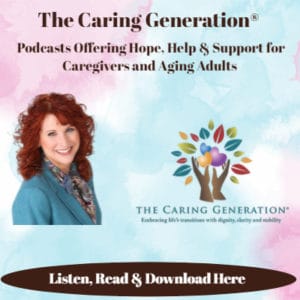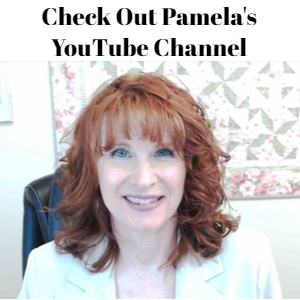Caregiving and Caregiver Support: Lifelong Learning Benefits
 By Pamela D. Wilson, MS, BS/BA, NCG, CSA
By Pamela D. Wilson, MS, BS/BA, NCG, CSA
Caregiving or care receiving is not for sissies. “That which does not kill us, makes us stronger.” German philosopher, Friedrich Nietzsche, knew what he was talking about. Grandma Mary, well into her 90’s shook her crooked arthritic finger at me and said “it’s no good to get old”.Caregiver or care receiver, we have days when we ask, “what else could possibly happen?”Not the question to ask as the moment we think or utter these words, another unpleasant event occurs. Worry and negative thoughts, common in caregiving situations, are self-fulfilling events. Caregiving and caregiver support are important to advocating and to receiving better than average care. Optimism, a belief in success, and lifelong learning are all antidotes to help us feel more positive, less overwhelmed, and less anxious.
The thoughts and actions of caregivers and care receivers result in the events of daily life. Actions equal results. Lifelong learning provides motivation and optimism.My mom took me to the library every Saturday for children’s book club beginning at the age of six. I left the library each week with my stack of books. I returned the next week to check out more. This early experience turned into a lifelong connection and a love of education, learning, and reading. 
Lifelong Learning Results in Receiving Better than Average Care
Caregivers and care receivers benefit from lifelong learning. Learning to advocate and to receive better than average care are special talents that can be learned. Sixty percent of adults, age 65 and over, (before a diagnosis of memory loss) have basic or below average health literacy.(1) Why is this important?
Low health literacy results in a variety of challenges. These include locating health services like physicians, therapists, medical offices, labs, and diagnostic testing locations. Review of documents and completion of forms are an ongoing part of receiving medical care. Caregivers and care recipients are unable to understand information in the forms; meaning that forms are signed out of the desire to receive medical care with little understanding of the agreements made.
Low financial literacy contributes to difficulties in evaluating costs of insurance, prescription drug, and other benefit plans. Co-pays and deductibles may be confusing. Budgeting retirement income and savings to pay for housing, healthcare, and daily living expenses can be difficult. The simple task of balancing a bank statement may be difficult.
A positive attitude, lifelong learning and motivational quotes from the masters helped me through years as a family caregiver and then as a professional caregiving advocate since 1999. Losing a sister, both parents, and a brother by the age of 40 was life changing for me. Tragedy? Opportunity? Blessing? While the losses were very difficult, the result was a blessing. These losses led to my current career as a caregiving expert, advocate, and speaker.
Caregivers and Care Receivers “Don’t Know What You Don’t Know”
Are you a caregiver or care receiver who feels worn-out, frustrated, anxious, or worried? You can’t imagine not being a caregiver. New issues arise and you are unsure about what steps to take. As a care receiver, you wish you could turn back the clock on a long list of health problems that might have been prevented if you asked better questions years ago. You are tired. There is no energy left to fight the healthcare system. The result? You will not receive the care or attention that is essential for your health. It’s important for caregivers to take a break, called respite, to re-energize the mind and body.
Hospitals, physicians, insurance companies, and others act as if they are too busy. They make you feel like you are a problem rather than someone who deserves help. Other professionals may have offered information and recommendations. They were wrong. Time and money were wasted. Recommendations failed to provide the expected result. Who can you trust?
These experiences were mine as a family caregiver. I had no idea that I didn’t have the skills or knowledge to make sure mom received better than average care. In the past 20 years I have learned that healthcare advocacy is a special talent and have honed my skills. If I had known the right questions to ask, my mom may have lived beyond her 69th year. The doctors were nice but did not offer recommendations that would have allowed us to be more proactive with her care. If we knew more about mom’s diagnosis, prognosis, and concerns to monitor, different decisions would have been made.
As a professional advocate, I meet uncaring and impatient medical and care professionals in all types of client situations. Conversations must be held about the importance of the information to the client while acknowledging the stress experienced by the care professionals. I understand that hospitals, care communities and care agencies are understaffed and faced with constant issues. Keeping this in mind, my client deserves care and attention.I know the questions to ask. A response of “no” from lazy or disinterested care staff to my requests is not acceptable. Family caregivers and care receivers express the same frustrations to me. They feel ignored by healthcare industry professionals.
By not being thorough and paying attention to the little things, mistakes happen. We all want to avoid last minute crises and unintentional mistakes. While we realize the healthcare system isn’t perfect, we know there is room for improvement. How many times have we said, “if only I knew,” after making a mistake. Caregivers and care receivers have the opportunity to know and learn the special talents of advocacy. You can avoid rear view window mistakes, self doubt, and feelings of guilt that you make the wrong choice.
Lifelong Learning Provides Motivation and Optimism
Through The Caring Generation Library®, my book The Caregiving Trap® , and ongoing programming I inspire and give hope to caregivers and care receivers that receiving better than average care is possible. Caregivers are on the front lines battling the healthcare system to receive better than average care for aging parents and family members. Through my lifelong learning efforts, I offer timely and relevant information to caregivers and care receivers. The journey of care can be positive if you know the steps and take the right actions.
Below are four quotes from Friedrich Nietzsche to support lifelong learning and hope. Solutions exist – no matter how challenging or impossible the situation may seem. I have related my personal, family, and life situations to the quotes. In over 20 years I have been involved in situations that appeared hopeless. I advocated for medical care and been fired by at least one doctor for disagreeing with him. Hint: doctors don’t always know best! My caregivers and care receivers deserve the best which may not always be a physician with an ago. .
Learning from Friedrich Nietzsche
Sometimes people don’t want to hear the truth because they don’t want their illusions destroyed
My brothers, sisters, and I believed that dad would pass before mom and we would be left caring for her. The statistics are everywhere. Women outlive men. We believed the statistics. My dad had a saying when things didn’t go as planned, “I don’t know what I was thinking.” The opposite occurred, mom passed before dad. I don’t know what we were thinking.
Mom had lifelong and severe heart problems. She had quadruple bypass surgery at age 60. She was a lifelong heavy cigarette smoker. She experienced multiple mini-strokes and had an aneurysm near her brain that could burst at any moment. My phone rang nearly weekly with a request to take her to the hospital. She died at age 69. We, the adult children, wore rose-colored glasses because we didn’t want to face the reality of losing mom.
He who has a why to live can bear almost any how
Dad was a World War II veteran who survived the Solomon Islands campaign (a bit of history for you to research). He was hard working—up early in the morning and off to work. One of his hobbies was planting flower and vegetable gardens. We had fresh flowers in the house and ate vegetables from the garden during the summer. He was a devoted husband and father. He enjoyed Notre Dame football on the weekends. During the summer dad taught me to catch night crawlers, fish, bicycle ride, and mow the lawn. He had more time and attention to devote to me, the baby, as the other 5 children were well on their way to being grown. Dad was part of the Greatest Generation who did what they had to do to support their families. He didn’t complain about hard work or putting in a little “elbow grease”.
I was in darkness, but I took three steps and found myself in paradise. The first step was a good thought, the second, a good word; and the third, a good deed.
I felt like an orphan after losing both of my parents before the age of forty. After feeling sorry for myself and having a brief “pity party, my solution was to volunteer. I found a volunteer program through a hospital that was called a friendly visitor program. The universe sent me a delightful elderly woman who lived within walking distance of my home. She was home bound. For over a year I visited her weekly and was on the receiving end of her experiences and stories.
In addition to the loss of my family members, she was the inspiration for the career I have today. At the times you feel sorry for yourself, give yourself a limited time—a day or a week—to have a pity party. Go to counseling if this is beneficial. Then do something nice for someone else. You will feel better and the other person will appreciate the good deed.
You must be ready to burn yourself in your own flame. How could you rise anew if you have not first become ashes?
There are times in all of our lives when one door shuts and another opens. We lose a job. A marriage ends. A loved one passes. We don’t get whatever it is that we want. We receive what seems like a hopeless health diagnosis. We fear change. Life seems unfair. We ask the universe for mercy not realizing we may have been given mercy through a new opportunity that we can’t yet understand.
Being able to view life experiences as a lessons rather than penalties is important. Seeking information and lifelong education to help us cope with changes gives us choice and power over our actions and future results. Looking for the bright side of situations is valuable skill to learn if you are not naturally optimistic. Optimism, positive thinking and belief that good things will happen can keep us going.
Life Experiences are Lifelong Learning Experiences
Believing that there is a greater purpose in all experiences is the key to surviving caregiving, care receiving, and other life situations. My life is proof. I’ve been blessed. Through life experiences viewed by others as tragic, I found my purpose in live as a caregiving expert, resource, and champion and supporter of caregivers and care receivers.
Believe. Hope. Act. Never give up trying. Positive results come from persistence. “Can’t do” or “no” aren’t options. “Won’t do” limits your options and stops progress. Close a door. Open a new door. Become a lifelong learner. Be inspired. Be motivated. Godspeed on your caregiving or care receiving journey!
Sources: 1 Improving Alzheimer’s Disease and Other Dementia Care Through Health Literacy. Wisconsin Health Literacy. Supported by a grant from Bader Philanthropies, Inc. wisconsinhealthliteracy Friedrich Nietzsche, German philosopher.
© 2018 Pamela D. Wilson, All Rights Reserved.
Pamela D. Wilson, MS, BS/BA, CG, CSA, a National Certified Guardian and Certified Senior Advisor, is a caregiving and elder care expert, advocate, and speaker. Pamela offers family caregivers programming and support to navigate the challenges of providing, navigating, and planning for care. She guides professionals practicing in estate planning, elder and probate law, and financial planning to create plans to address unexpected concerns identified in her past role as a professional fiduciary. Healthcare professionals are supported by Pamela’s expertise to increase responsiveness and sensitivity to the extensive range of care challenges faced by care recipients and caregivers. Return to the Aging Issues & Solutions Category Page Return to the All Category Page



